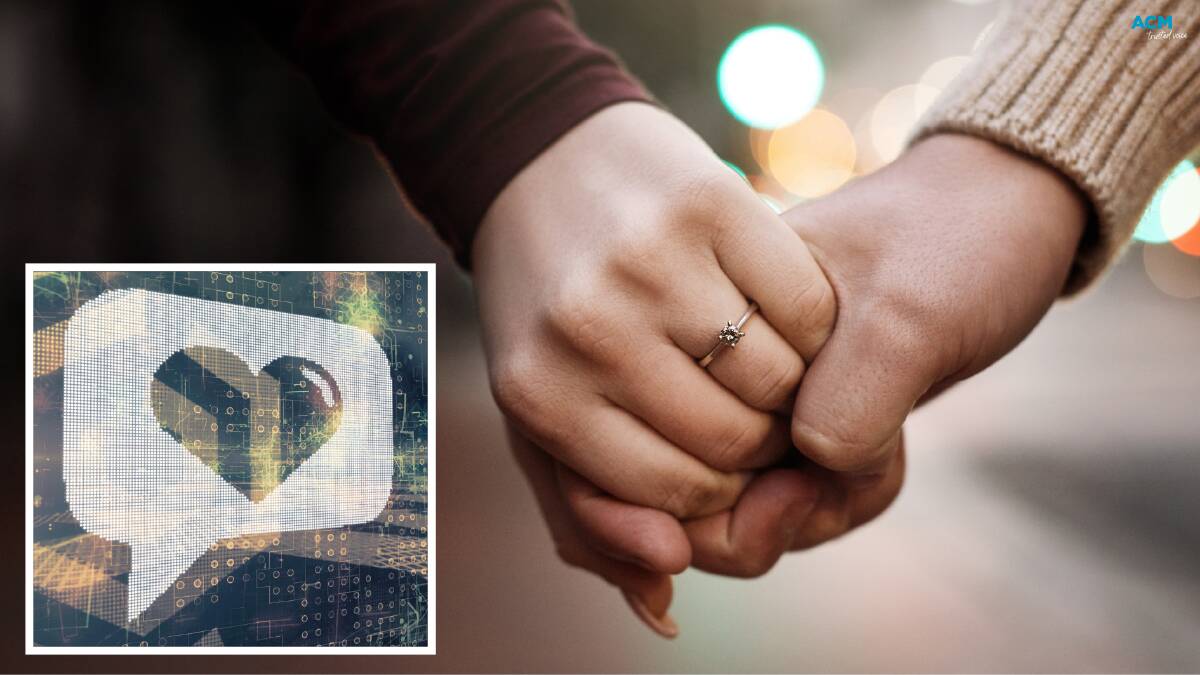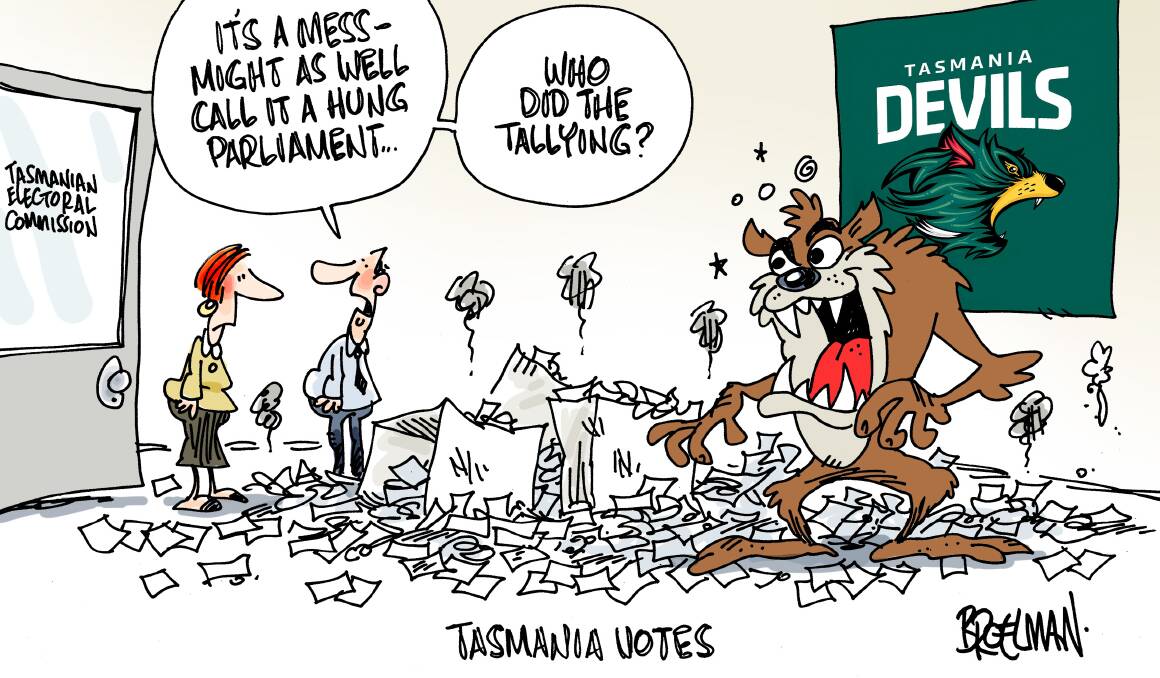
This is a sample of The Echidna newsletter sent out each weekday morning. To sign up for FREE, go to theechidna.com.au
I'm very old-fashioned. I've met my longish-term partners in that dreary old face-to-face way. It led to tummy-to-tummy - but gradually, at its own pace.
We got to know each other over weeks, months even, usually at work. We had observed each other's foibles and quirks at a distance, in an unpressured non-romantic environment.
So we knew what we were getting into. There were no surprises where somebody suddenly revealed that they were, let's say, an anti-Semite or didn't like music or did like rugby league.
So I feel sorry for young people today who rely on dating apps.
The poor dears tell me that, after one date, they get plagued with text messages. "How's your day going?" that kind of thing - from a person they barely know, in fact from a person they don't really know at all.
Or take this complaint from a friend who dates online: "No matter how good a first date is, it doesn't warrant a declaration of love."
"Anyone who thinks they're in love after one date is kidding themselves. Possibly borderline delusional.
"Really 'love' after a first date is at most, love of a one-dimensional version of someone - something that in the long run, is really hard to live up to."
How true. Love blossoms. It doesn't explode.
There is hope, though. It may be that there are a lot of people on dating websites who don't actually meet their partners through them. They sign up to keep their options open - they shop in many markets, as it were - but end up meeting people in the reliable old ways.
The latest survey by Relationships Australia found that "people were more likely to meet through family or friends (29 per cent), at a social event (19 per cent), through work (16 per cent) or in an educational setting (14 per cent) than online (12 per cent)".
Phew. There may still be room for flirting, and even old-fashioned romance where people get to know each other gradually.
It would be nice to think that dating apps have had their day. They seem like too cold a mechanism - too cynical, too much like a market.
They have degenerated from what once seemed like a good idea - an online forum for people to meet - to a commercial venture.
It's the way of the technological world. What starts out as an innovative way of helping many people turns into a product where money is sucked out.
Dating sites, according to those who use them, have become either expensive or cruddy. There are paid-for special sections where money gives the seeker of heart-to-heart or tummy-to-tummy access to a higher class of date (or so it's supposed), or there is the rest for free. You pay for the elite or you go free for the remainder.
So dating sites have become "enshittified". Don't blame me for the word. I read it in the Financial Times.
It was coined in Wired magazine by Cory Doctorow who is a science-fiction writer but also one of the world's most perceptive analysts of technology and society.
The best definition of enshittification is: "The phenomenon of online platforms gradually degrading the quality of their services, often by promoting advertisements and sponsored content, in order to increase profits."
Doctorow explained in the FT: "It's a three-stage process: first, platforms are good to their users. Then they abuse their users to make things better for their business customers. Finally, they abuse those business customers to claw back all the value for themselves. Then, there is a fourth stage: they die."
Let us hope for this fourth terminal stage of the dating app. Bring back slow-burn relationships which grow steadily to passion and, yes, even love.

HAVE YOUR SAY: Are there instances you can think of where the old is better than the new and flashy? Tea trolleys? Email your response to echidna@theechidna.com.au.
SHARE THE LOVE: If you enjoy The Echidna, forward it to a friend so they can sign up, too.
IN CASE YOU MISSED IT:
- The Prince and Princess of Wales have thanked supporters around the world for their kindness following a shock cancer diagnosis. Princess Kate, 42, says she is undergoing preventative chemotherapy after tests taken following major abdominal surgery in January revealed that cancer had been present.
- One of Australia's last remaining World War II veterans is being remembered after his death, aged 100. Allan Godfrey died on March 20 just a few days before his 101st birthday, according to the Caroline Springs RSL Sub Branch in Melbourne's west where he was a member.
- Inflation is moderating but still too high and the monthly consumer price index will be watched keenly for further evidence of easing price pressures. The Australian Bureau of Statistics will release the February consumer price index data, a key of measure of inflation, on Wednesday.
THEY SAID IT: "It is a truth universally acknowledged, that a single man in possession of a good fortune, must be in want of a wife" - Jane Austen in Pride and Prejudice.
YOU SAID IT: Garry admitted to his guilty pleasure of true crime, and from your responses it seems he is far from alone.
Monica tells us she devours every episode of Law and Order SVU, with Death in Paradise as her light relief. "That being said that, at 85, I also feed on quiz shows as I feel the need to keep the brain active. Like many others I suppose, I take great pleasure in answering quiz questions that contestants can't."
Jennifer, though, is the opposite. "I've never understood violence, abuse or cruelty, so seek to know why people do it. I also like to know how best to avoid it. I can't watch it. Reading about it is useful, although sadly the media often announce the crime and don't follow up. They may report on the punishment, but punishment rarely solves anything, often making a person more angry and vindictive, so more likely to reoffend. Of much more interest to me is the motive and the rationale behind the action, the triggers as well as the more distant influences."
True crime isn't for Lee, either. "I work with people who do crime, I don't need to read about it as well. I do love Christmas romcom's, even when it isn't Christmas."
Sandra is also a crime addict "but very selective, Donna Leon being my favourite - her books based in Venice, followed by Spencer Quinn whose offsider is his dog who actually writes the story, both rather quirky."
For Lai, it's a "great way to escape the reality of the stupid world we are trapped in ... I love it all, thrive on it in fact."


